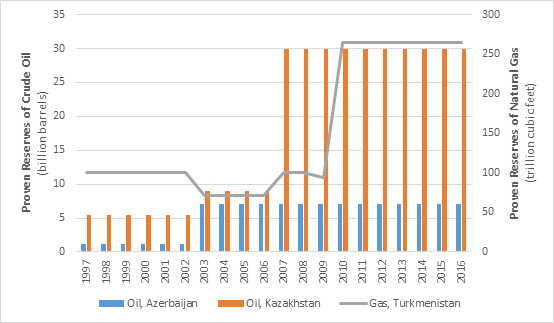
Energy security is a crucial issue in contemporary international relations but not a new one. It is usually defined as the reliable and sufficient supply or demand of energy at acceptable prices and is at the top of the agenda for both energy-importing and energy-exporting countries. While energy-importing countries need an uninterrupted and accessible energy supply to keep up with economic development, energy-exporting countries need energy export revenues to finance their economic and social development (Yenikeyeff 2006). Thus, it can be argued that energy security has a multidimensional nature: security of demand and security of supply. The location of energy-importing and energy-exporting countries in different geographies determines the geopolitical dimension of energy security. These dimensions of energy security increase the mutual interdependence between energy importers and energy exporters.
The Caspian Basin comprises a large share of the global energy supply and accounted for 3% of the global oil supply and 6% of the global natural gas supply in 2017 (BP 2018). Azerbaijan has 0.4% of global crude oil reserves, ranking 21st in the world, while Kazakhstan has 1.8% of global crude oil reserves and ranks 12th. Turkmenistan has 265 trillion cubic feet of natural gas reserves and ranks 11th in the world (Figure 1).
Figure 1. Proven Fossil Fuel Reserves

Source: Authors’ compilation using data from BP (2018).
The importance of the Caspian Basin as a source of energy is increasing due to current geopolitical developments. Crude oil and natural gas are being transported from Azerbaijan, Kazakhstan, and Turkmenistan via countries with high, volatile political risk. Considering the energy transport route from the Caspian Basin to the European Union through the Russian Federation, Ukraine, Georgia, and Turkey, it can be argued that the energy security of demand is highly contingent on energy transportation. Unstable and changeable political situations in these regions as well as conflicts there can pose risks for energy exports from the Caspian region to the European Union.
In a recent study (Aydin and Azhgaliyeva 2019), we capture these risks by developing an aggregate index for measuring the security of demand. The index is a product of individual indicators, including political risks in energy-transporting countries. Energy security indicators are tools for communicating energy issues to policy makers and the public, and there is a need for measures that can capture the geopolitical situation and inform policy makers about the impact of the challenges of energy security on energy transportation in the Caspian region.
There are several methodologies for measuring energy security. While most of them are used to measure the security of supply, we adapt the risky external energy demand (REED) index to evaluate the energy security of demand. Using data over the period 2000–2017 for Azerbaijan, Turkmenistan, and Kazakhstan (Azhgaliyeva 2019), our analysis measures the energy security of demand of two energy sources: crude oil and natural gas.
The results show that the REED index for Azerbaijan and Kazakhstan increased significantly from 2014 due to a reliance on crude oil transportation through Ukraine and Turkey. This occurred due to a sharp decrease in the World Bank’s Political Stability and Absence of Violence index for Ukraine from 2014 and in Turkey from 2015 (World Bank 2018).
The REED index for Turkmenistan is higher than for Azerbaijan and Kazakhstan due to its high dependency on imports of natural gas by one country, i.e., the PRC from 2010 and Ukraine before 2010. The greater diversity of importers of crude oil from Azerbaijan and Kazakhstan than for natural gas in Turkmenistan explains the lower risk for external demand for crude oil in Azerbaijan and Kazakhstan than for natural gas in Turkmenistan.
The results demonstrate the importance of considering the political risk in energy-transporting countries when the energy security of demand is measured for energy-exporting countries without direct access to importers, e.g., Azerbaijan, Turkmenistan, and Kazakhstan. The study developed a simple methodology and uses open access data that allows the REED index to be produced for other periods, countries and exporting fuels. This methodology can be implemented to generate indicators that can measure the security of demand for countries that do not have direct access to energy importers and depend on energy-transporting countries.
Consequently, to ensure the energy security of the Caspian Basin, there is a strong need for cooperation between energy-exporting, energy-importing, and energy-transporting countries in order to diversify the energy-transporting countries or find routes that pass through countries with greater political stability.
Read the working paper here.
_____
References:
Aydin, U., and D. Azhgaliyeva. 2019. Assessing Energy Security in the Caspian Region: The Geopolitical Implications for European Energy Strategy. ADBI Working Paper 1011. Tokyo: Asian Development Bank Institute.
BP Statistical Review Of World Energy 2018. Accessed 02 November 2018.
Azhgaliyeva, D. 2019. Data from: Assessing Energy Security in Caspian Region: The Geopolitical Implications to European Energy Strategy, ScholarBank @NUS Repository. Dataset.
Yenikeyeff, S. M. 2006. The G8 and Russia: Security of Supply vs. Security of Demand? Oxford Energy Comment. The Oxford Institute for Energy Studies. (accessed 20 January 2019).
World Bank. 2018. Worldwide Governance Indicators. www.govindicators.org (accessed 13 December 2018).








Comments are closed.